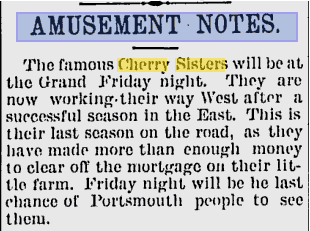The Cherry Sisters: good or bad?

Somehow, 100 years ago, five apparently talentless siblings from Marion, Iowa, reigned as America’s most famous female vaudeville team. For many years I have gathered information on the Cherry Sisters — Ellie, Lizzie, Addie, Jessie and Effie — and have found their lives full of puzzling events and psychological enigmas. Why did audiences come to see them? Did they really need netting to protect them from fusillades of rotten vegetables from the audience? And then there’s the biggest question of all: Did the Cherry Sisters realize they were bad?
Their atrocious performances — full of acrid singing, childish skits, and awkward religious tableaus — brought them notoriety. Early in their stage careers, a Cherry Sisters stage show in Dubuque, Iowa, sparked the worst riot in the city’s history. The audience mocked the Sisters’ singing by raining cabbages, onions and even an old tin wash boiler on the stage, and tore up the seats. One witness to a Cherry performance complained that the Sisters sang in “totally unclassified tones, indescribably in their awfulness. All expectations of a rank performance were disappointed. It was lots, lots ranker than anyone in his sane moments ever imagined.”
Another published slam announced that “the mouths of their rancid features opened like caverns, and sounds like the wailing of damned souls issued therefrom…. Effie is spavined, Addie is knock-kneed and springhalt, and Jessie, the only one who showed her stockings, has legs without calves, as classic in their outlines as the curves of a broom handle.” Critics catalogued their badness in terms never applied to men. And so things went for years in their performances from Des Moines to Chicago to New York — on and off from 1893 to 1936.
The actress Marie Dressler was said to have been uncertain of the authenticity of the Sisters’ badness. A frustrated Des Moines Register writer declared that “either the Cherry Sisters are completely sincere and take themselves seriously, or they are the most accomplished actresses the world has ever known.”
I’ve concluded that the Cherrys “played bad” to keep folks coming to their shows. Though undoubtedly lacking in artistry, they exploited badness to stay in the public eye. It was their brand. When Addie and Effie performed at a radio station barn dance in 1936, Effie — who twice ran farcical campaigns to become mayor of Cedar Rapids — was asked whether she thought their act good. “Good?” she shot back. “There’s 2,500 people out there, isn’t there?… Good! You’ve got to be good to pack as many people in as we have for 40 years.”
Like us all, the Cherry Sisters were complicated. They didn’t appreciate insults but kept taking them. They complained of the moral impurity of other performers (singling out Mae West for special scorn), but sued when others judged them harshly. (Their infamous libel lawsuit against a newspaper, argued before the Iowa Supreme Court, produced a landmark decision that upheld the right of the press to publish public criticism and fair comment.) They craved privacy and drew attention to themselves.
After Effie became the last Cherry to die in 1944, most people who recalled the Sisters at all remembered them as simply bad. That’s a shame, because the Cherrys were bad and so much more.